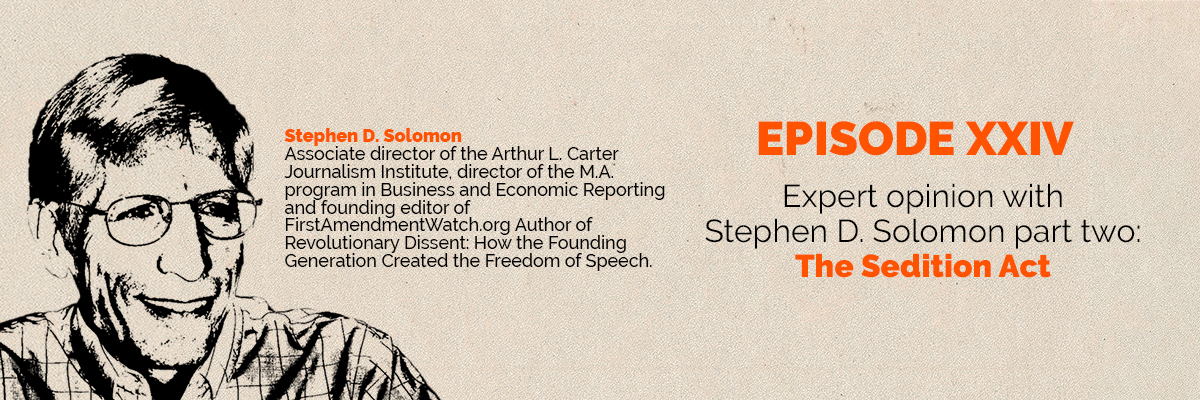In 1787, the newly authored U.S. Constitution was sent out to the states for ratification. Despite fierce objections from Anti-Federalists, the Constitution did not include a bill of rights protecting freedom of speech and the press. The Anti-Federalist newspaper the Independent Gazetteer published an ironic comment on what the future of free speech would look like if the Constitution was ratified:
Ah! what glorious days are coming; how I anticipate the brilliancy of the American court! … [H]ere is the president going in state to the senate house to confirm the law for the abolition of the liberty of the press. Men and brethren will not these things be so?
Even though the Bill of Rights was adopted in 1791, the Independent Gazetteer’s withering sarcasm had been prophetic: On July 14, 1798, President John Adams signed the Sedition Act into law, making it a crime to “write, print, utter, or publish…any false, scandalous and malicious writing against the government of the United States, or either house of the Congress of the United States, or the President of the United States, with intent to defame…or to bring them…into contempt or disrepute; or to excite against them…the hatred of the good people of the United States.”
A mere seven years after the adoption of the Bill of Rights and the First Amendment’s promise that “Congress shall make no law…abridging the freedom of speech, or of the press,” Congress had done just that. The Sedition Act paved the way for the prosecution and imprisonment of both journalists, editors, politicians, and ordinary Americans engaging in political, satirical and symbolic speech.
In part two of this conversation with NYU professor Stephen Solomon, we explore how the Americans who had championed freedom of speech as the “great bulwark of liberty” and thumbed their noses at English sedition laws in the lead up to the Revolution came to adopt their own sedition law. We discuss issues including:
- The deeply polarized political environment of the 1790s;
- The fiercely partisan attacks of both Federalist and Democratic-Republican newspapers on political opponents;
- How the Sedition Act differed from seditious libel under English common law;
- The arguments for and against the constitutionality of the Sedition Act;
- James Madison’s eloquent and elaborate defense of robust free speech protections;
- The congressman, journalists and ordinary Americans who were prosecuted and imprisoned for voicing their opinions;
- The prosecutorial zeal of Secretary of State Matthew Pickering and Supreme Court Justice Samuel Chase (aka “Old Bacon Face”);
- The unintended consequences of the Sedition Act which strengthened Democratic-Republican newspapers and politicians and weakened Federalists; and
- Thomas Jefferson’s magnanimous inauguration speech.
Marjorie Deane Professor of Journalism at New York University’s Arthur L. Carter Journalism Institute; teaches First Amendment law and is founding editor of First Amendment Watch, which covers current conflicts over freedom of expression. Author of Revolutionary Dissent: How the Founding Generation Created the Freedom of Speech.
Why have kings, emperors, and governments killed and imprisoned people to shut them up? And why have countless people risked death and imprisonment to express their beliefs? Jacob Mchangama guides you through the history of free speech from the trial of Socrates to the Great Firewall.
You can subscribe and listen to Clear and Present Danger on Apple Podcasts, Google Play, YouTube, TuneIn, and Stitcher, or download episodes directly from SoundCloud.
Stay up to date with Clear and Present Danger on the show’s Facebook and Twitter pages, or visit the podcast’s website at freespeechhistory.com. Email us feedback at freespeechhistory@gmail.com.
